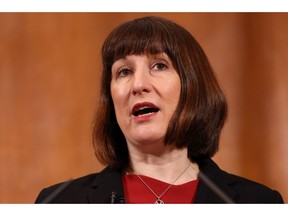The opposition Labour Party’s chancellor-in-waiting Rachel Reeves pledged a fundamental “course correction” for the UK economy, saying the country needed to invest in growth and solve underlying structural problems to break the grip of stagnation.

Article content
(Bloomberg) — The opposition Labour Party’s chancellor-in-waiting Rachel Reeves pledged a fundamental “course correction” for the UK economy, saying the country needed to invest in growth and solve underlying structural problems to break the grip of stagnation.
Reeves told the prestigious Mais Lecture in the City of London that the country was already “stumbling blindfolded” into an era of bigger state spending by responding to events rather than shaping them in advance. The shadow Chancellor of the Exchequer argued that bolstering job security for workers was essential to improving Britain’s poor productivity growth.
Advertisement 2
Article content
Article content
“What is demanded is a fundamental course correction,” Reeves said Tuesday. “The stakes have rarely been higher. Not only for the living standards of working people. Not only for Britain’s competitiveness in a fast-changing world — though both are at stake. But also for the health of our democracy.”
With Keir Starmer’s Labour about 20 points ahead of Rishi Sunak’s Conservative Party in national polls before a UK election expected later this year, Reeves is on track to become Britain’s first female chancellor. But she faces major questions about her priorities, especially after the government used this month’s budget to squeeze the opposition’s revenue-raising plans.
The economy is expected to be a key theme in the election, with Britons facing a prolonged squeeze on living standards. On Tuesday, Chancellor of the Exchequer Jeremy Hunt dropped a strong hint that the government is considering calling the vote in October, even though it doesn’t legally need to be held until January.
Though much of Reeves’s speech contained policies already announced, it was also a clear attempt to set out a cogent vision for government. The Mais Lecture is widely regarded as a showpiece event that has been presented by a slew of former chancellors including George Osborne and Gordon Brown.
Article content
Advertisement 3
Article content
The former Bank of England economist reiterated her “securonomics” idea, effectively the Bidenomics-style blend of self-reliance in key products such as energy while reducing barriers to trade, including with the European Union.
“We have seen the cost of neglecting the delicate balance between flexibility and security, between the allure of just-in-time production and the demand for resilience, and of turning a blind eye to where things are made and who they are owned by,” she said.
More broadly, though, she sought to reassure the assembled bankers, economists and analysts that she represents a predictable approach to the UK’s coffers. She didn’t reference Liz Truss by name, but criticized the economic chaos triggered by the populist former prime minister’s “mini budget” of unfunded tax cuts.
She also called ex-premier Boris Johnson’s Brexit deal with EU “rushed and ill-conceived” and said that Osborne’s austerity policies and failure to invest after 2010 “was an act of historic negligence.”
Other promises appeared aimed at fending off traditional Conservative attacks about Labour’s spending plans. She said her government would stick to current fiscal rules requiring debt to be falling as a percentage of GDP after five years and to balance day-to-day spending.
Advertisement 4
Article content
She also pledged to remove the escape clause she said allowed chancellors to rewrite rules on a whim, and reiterated her pledge to borrow only to invest.
But Reeves faced immediate criticism one of the UK’s largest trade unions and a key Labour supporter, showing the delicate balance that Starmer and his team are strike as they return to turn to power for the first time in 14 years. Sharon Graham, general secretary of the Unite union, said Reeves’s decision to stick to “phoney fiscal rules” to refuse higher income taxes on the wealthy would leave Labour “in a straitjacket.”
Reeves explained that the party’s decision to roll back its £28 billion ($36 billion) green investment plans was due to the “changed circumstances” since October 2021. Higher debt and interest costs have increased debt servicing since then to £82 billion from £29 billion.
Reeves said she would reinstate climate impacts in the Bank of England’s monetary and financial policy remits. Hunt, the chancellor, removed climate change from the monetary policy remit last year.
“The next Labour government will reverse these changes, at the first opportunity. Because there can be no durable plan for economic stability and no sustainable plan for economic growth, that is not also a serious plan for net zero,” Reeves said.
Advertisement 5
Article content
She also recommitted to other measures that businesses have raised concerns about, including a ban on so-called zero-hours contracts — though she said unfair dismissal rules would only apply after a probation period.
Sunak and Hunt are trying to build a campaign around pre-election tax cuts, which are designed to win over voters but also make it more difficult for Reeves to show how she would pay for her policies.
Speaking in the House of Lords earlier on Tuesday, Hunt said the budget impact on departments would be “challenging” and indicated that reforms to the UK state pension and welfare benefits are being considered. Hunt said the triple lock — which guarantees that the state pension rises by the highest of inflation, average earnings or 2.5% — was “under review.”
But Labour’s commanding poll lead means it is Reeves who is widely expected to oust Hunt from No. 11 Downing Street after the election. That has made both Starmer and her in growing demand among businesses.
“I remain an optimist about our ability to rise to the challenges we face, if we can bring together public and private sectors, in a national mission directed at restoring strong economic growth across Britain,” she said. “When we speak of a decade of national renewal, that is what we mean.”
—With assistance from Ailbhe Rea.
(Updates with comments from Reeves throughout.)
Article content




